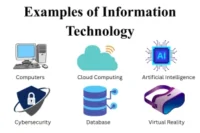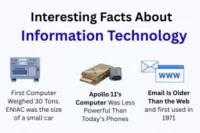Explore Must-Known Technology Terms that are Shaping 2025 and Beyond
Published: 27 Aug 2025
In today’s fast-paced digital world, staying updated on tech terms is more vital than ever. As fast advances transform sectors across the globe, professionals, company owners, and tech enthusiasts must comprehend the main words driving these innovations.
Whether you’re going into AI, researching the implications of 5G, or navigating cloud computing, knowing this terminology can help you make intelligent choices and capitalize on new possibilities.
As Artificial Intelligence continues to alter industries ranging from healthcare to finance, understanding its terminology is critical for keeping up with its transformational potential.
This article will break down both basic and developing technology phrases, providing you with the information you need to stay ahead of the trends in 2025 and beyond. Are you ready to explore the full potential of technology?
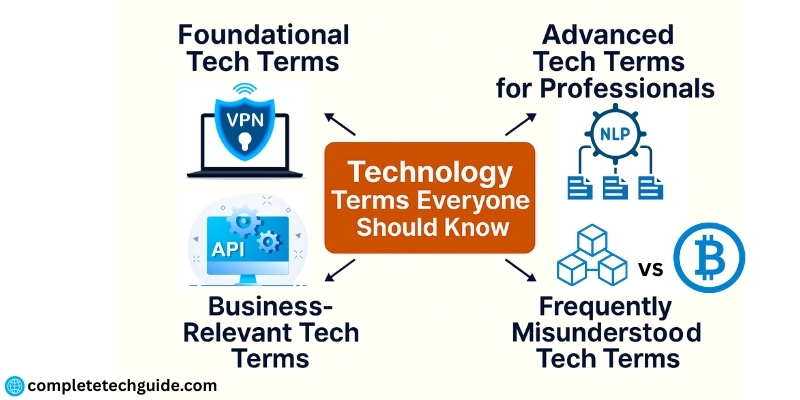
Foundational Tech Terms
In this section, you’ll find fundamental Top 10 Technology Terms that everyone should know who want to learn about the tech industry. Here is the list of their names:
1. Artificial Intelligence (AI)
2. Cloud Computing
3. Internet of Things (IoT)
4. Blockchain
5. Virtual Private Network (VPN)
6. Data Encryption
7. Operating System (OS)
8. Browser
9. URL (Uniform Resource Locator)
10. Software as a Service (SaaS)
11. Augmented Reality (AR)
1. Artificial Intelligence (AI)
Artificial intelligence is the capacity of machines to do activities that would ordinarily need human intelligence. AI can assess data, learn from past experiences, and make judgments.
AI is transforming industries like healthcare, finance, and entertainment by automating tasks and offering smarter solutions.
Example: Siri, Alexa, and other voice assistants use AI to understand and reply to your commands.
2. Cloud Computing
Cloud computing is the transmission of computer services such as storage, processing, and software through the internet rather than through local computers or personal devices.
It provides adaptability, capacity, and cost-efficiency, enabling organizations to eliminate physical infrastructure.
Example: Google Drive and Dropbox are cloud storage services that allow you to store files online and access them anywhere.
3. Internet of Things (IoT)
The Internet of Things (IoT) refers to the network of physical objects embedded with sensors, software, and other technologies that connect to the internet and exchange data.
IoT is revolutionizing industries by facilitating industrialization and real-time data collection, such as in smart homes or healthcare.
Example: Smart thermostats, such as Nest, regulate your home’s temperature based on your activity, all through the internet.
4. Blockchain
Blockchain is a global online database that securely records transactions across several computers. Once data is stored on a blockchain, it is very hard to modify, providing a high level of security.
Blockchain provides transparency and protection, making it perfect for use in cryptocurrencies, supply chain monitoring, and safe voting.
Example: Bitcoin operates on a blockchain, enabling secure transactions without the need for a central authority.
5. Virtual Private Network (VPN)
A VPN is a service that encrypts your internet connection, allowing you to browse the web privately and securely by hiding your IP address.
VPNs improve security and privacy, and allow users to get around regional limitations while viewing information online.
Example: VPNs are commonly used to protect sensitive data when using public Wi-Fi networks in cafes or airports.
6. Data Encryption
Data encryption is the process of converting data into a code to prevent unauthorized access. Only trusted groups can decode and access the original information.
Encryption protects confidential data from cyber attacks, particularly in sectors such as banking and personal information.
Example: When you shop online, your credit card details are encrypted to keep them secure from hackers.
7. Operating System (OS)
An operating system is software that manages a computer’s hardware and software capacities while also providing services to computer programs.
The operating system (OS) is the basis for carrying out applications, managing data, and assuring hardware functionality.
Example: Windows, macOS, and Linux are popular operating systems.
8. Browser
A web browser is a software application used to access and view websites on the internet.
Browsers allow users to explore the internet and access digital assets, making them necessary for online activities.
Example: Google Chrome, Mozilla Firefox, and Safari are common web browsers.
9. URL (Uniform Resource Locator)
A URL is the web address used to access websites or online resources. It includes the protocol (like http:// or https://), the domain name, and sometimes a route to a specific page.
URLs are how users and search engines locate resources on the internet.
Example: The URL for this page might be something like https://example.com/technology-terms/.
10. Software as a Service (SaaS)
SaaS is a software distribution model in which programs are hosted by a third-party provider and made available to customers via the internet, typically through a subscription.
SaaS allows enterprises to avoid the cost and complicated nature of managing physical software resources.
Example: Google Workspace and Salesforce are popular SaaS platforms.
11. Augmented Reality (AR)
Augmented Reality overlays digital content (images, sounds, etc.) onto the real world, enhancing the user’s environment.
AR is revolutionizing industries such as gaming, education, healthcare, and retail by offering immersive and interactive experiences.
Example: Pokémon Go is a popular game that uses AR technology to display virtual creatures in real-world locations through your smartphone camera.
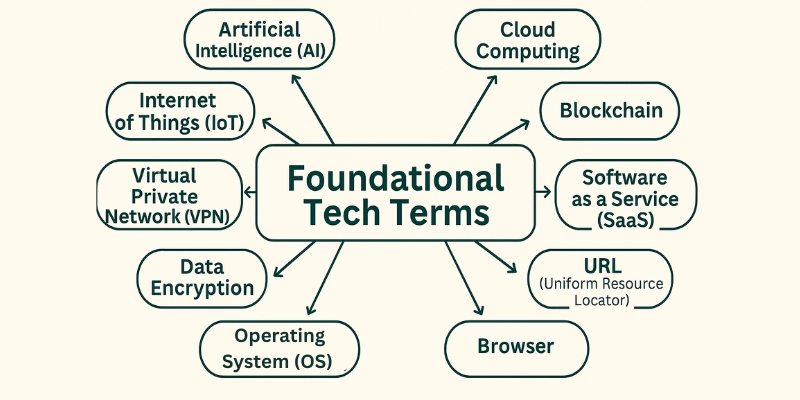
Advanced Tech Terms for Professionals
As technology evolves at a rapid rate, individuals in the technology sector and beyond must become familiar with complex terminology to remain competitive. Professionals should be familiar with the following advanced technical terms.
1. Natural Language Processing (NLP)
Natural Language Processing (NLP) is a field of AI focused on enabling computers to understand, interpret, and generate human language in a meaningful way.
NLP is used in applications like chatbots, voice assistants, and emotion analysis, allowing machines to communicate effectively with humans.
Example: Siri and Google Assistant use NLP to process and respond to spoken commands in natural language.
2. Edge AI
Edge AI refers to the application of artificial intelligence to devices used for computing that process data locally, at the “edge” of the network, rather than in a controlled cloud environment.
Edge AI is vital for making decisions in real time in IoT devices, autonomous systems, and smart applications that require little latency.
Example: Amazon’s Alexa can process voice commands locally on devices like the Echo.
3. Robotic Process Automation (RPA)
RPA (Robotic Process Automation) is the use of software robots or “bots” to automate repetitive operations like data input, transaction processing, and responding to simple consumer requests.
Businesses utilize RPA to minimize manual labor expenses, increase efficiency, and free up staff for other valuable activities.
Example: UiPath is a popular RPA tool that automates business processes like invoice processing and customer service workflows.
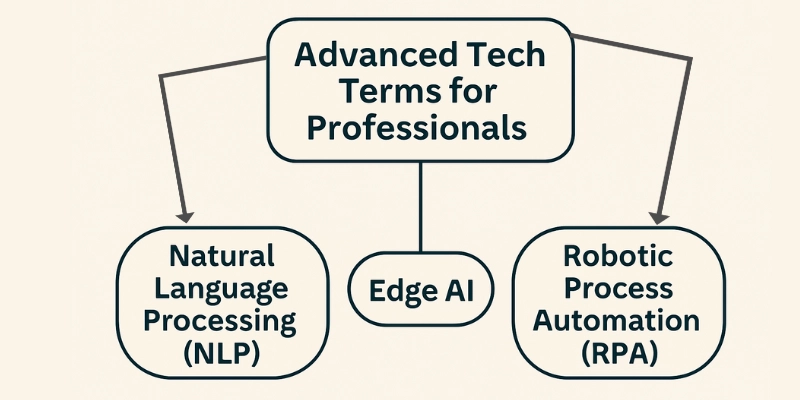
Business-Relevant Tech Terms
In today’s fast-paced digital world, understanding important business-related technological phrases is critical for entrepreneurs, marketers, and business owners. These phrases help organizations work more effectively, increase consumer involvement, and promote innovation.
Let’s look at some key tech phrases that are influencing the current business scene and show the importance of technology in our daily lives.
1. BYOD (Bring Your Own Device)
Bring Your Own Device (BYOD) is a policy that allows workers to use their devices (smartphones, tablets, and laptops) for work instead of the company’s hardware.
BYOD policies are used to lower the expenses involved with acquiring and maintaining technology while allowing workers to work on devices they are already comfortable with.
Example: Dell enables employees to use personal devices on their internal network through secure connections and applications.
2. API (Application Programming Interface)
An API is a set of protocols and tools that allow applications to connect, making it easier to integrate third-party services.
APIs allow organizations to connect and interact with other platforms such as payment processors (PayPal, Stripe), social media networks (Twitter, Facebook), and data sources, hence improving functionality and user experiences.
Example: Stripe API and Twitter API are the most common examples of tools that enable different software applications to communicate with each other
3. UX/UI Design
User Experience (UX) Design aims to improve users’ entire experiences while engaging with a product, notably websites or applications. User Interface (UI) Design is concerned with the arrangement and interactive components that users interact with on a screen.
Businesses engage in UX/UI design to make their websites and applications user-friendly and engaging, which increases customer satisfaction and drives conversions.
Example: Spotify uses a well-designed UI to make browsing music and playlists smooth for users across different devices.
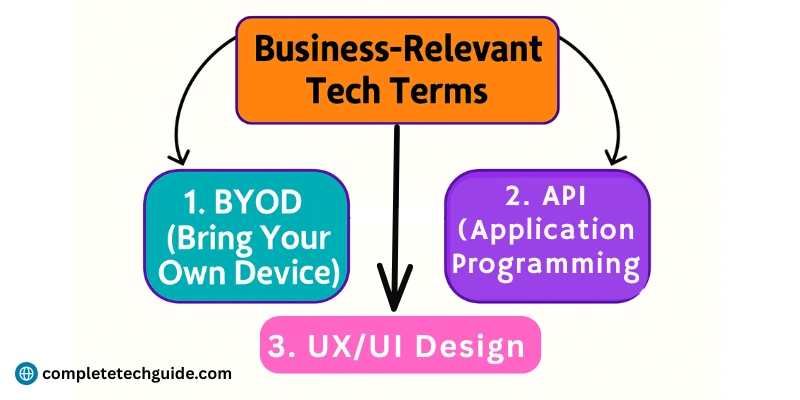
Frequently Misunderstood Tech Terms
Several words in technology are frequently misunderstood or misused. These misconceptions can be confusing, particularly among individuals who are new to technology.
In this part, we’ll explain some of the most popular tech term misconceptions and emphasize their essential distinctions.
1. Cloud Storage vs Cloud Computing
Cloud Storage: A service that allows users to store data (documents, photos, videos) on the internet rather than on a physical hard drive.
Cloud Computing: A more comprehensive concept that involves using remote servers (the “cloud”) to process, store, and manage data, as well as run applications and services.
Misunderstanding Explained:
People often use “cloud” to describe both storage and computing, but the two serve different functions.
Cloud storage is used just for data storage, while cloud computing refers to a range of services, including running applications, processing data, and more.
Key Differences:
- Purpose: Cloud storage is designed purely for data storage, whereas cloud computing provides a wider variety of services such as software development, database hosting, and resource management.
- Services: Cloud computing includes services like Amazon Web Services (AWS) and Microsoft Azure, whereas services like Google Drive and Dropbox represent cloud storage.
2. Blockchain vs Cryptocurrency
Blockchain: A global online database that records transactions across several computers while ensuring transparency and security.
Cryptocurrency: A form of digital money (such as Bitcoin or Ethereum) that uses blockchain technology to facilitate safe transactions without the involvement of middlemen such as banks.
Misunderstanding Explained:
Many people believe that blockchain and cryptocurrency are the same; however, blockchain is the fundamental technology that supports cryptocurrencies.
While blockchain has applications beyond crypto, such as in supply chain management or digital voting, cryptocurrencies are just one use case of blockchain technology.
Key Differences:
- Function: Blockchain is a technology used for securely recording and verifying transactions, while cryptocurrency is a form of digital money that operates on blockchain.
- Applications: Blockchain may be used for reasons other than cryptocurrencies, such as tracking supply chains, whereas cryptocurrency is only focused on digital payments and property.
- Scope: Blockchain is a wider term that has been studied in a variety of businesses, whereas cryptocurrency refers primarily to digital currencies such as Bitcoin, Ethereum, and others.
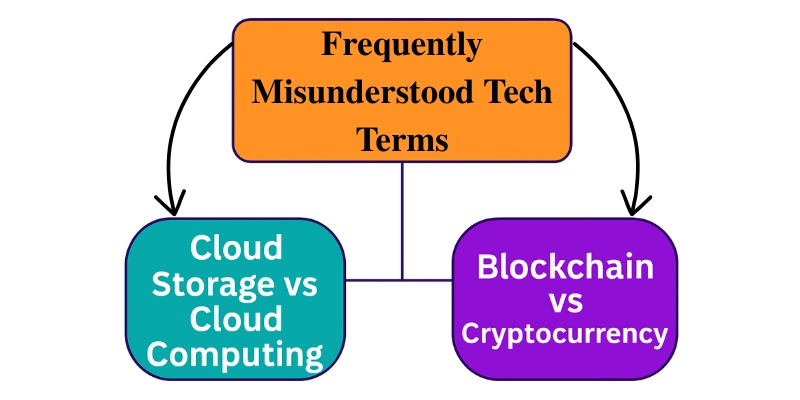
Conclusion
Knowing some fundamental technology terms is useful in today’s rapidly changing technological environment. Whether you own a business, work in an office, or simply enjoy learning new things, knowing terms like AI, Blockchain, Cloud Computing, and SaaS may help you feel less confused and more productive.
As technology becomes more integrated into our lives and workplaces, understanding what these tech terms for different fields represent will help you stay up to date and make smarter decisions. It doesn’t take much to get started, and as you learn more, it becomes easier.
If you want to stay educated and up to date about the latest technologies, please continue visiting our website Complete Tech Guide.
FAQs About the Latest Technology Terms
Here are the most asked questions about the Technical Terms in Technology.
Artificial intelligence (AI) is one of the most significant terms in technology nowadays. It enables machines to think and make judgments like people, and it is utilized in applications such as voice assistants, smart suggestions, and even self-driving automobiles.
Knowing technology terms allows you to comprehend modern innovations and trends, increasing your value at work. It also demonstrates to companies that you are prepared to learn and adapt in today’s digital environment.
AI will help businesses work faster and smarter by automating tasks, predicting trends, and giving better customer service. It’s becoming a key part of how companies grow and stay ahead.
Blockchain keeps records secure and undetectable, which is useful in areas such as product monitoring, medical data protection, and secure polling. Its applications extend well beyond Bitcoin and cryptocurrency.
Cloud computing enables organizations to store and access data online rather than utilizing physical servers. It saves money, allows remote work, and makes team collaboration easier.

- Be Respectful
- Stay Relevant
- Stay Positive
- True Feedback
- Encourage Discussion
- Avoid Spamming
- No Fake News
- Don't Copy-Paste
- No Personal Attacks



- Be Respectful
- Stay Relevant
- Stay Positive
- True Feedback
- Encourage Discussion
- Avoid Spamming
- No Fake News
- Don't Copy-Paste
- No Personal Attacks



